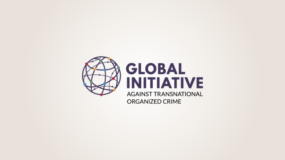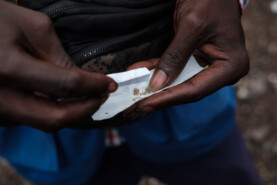Posted on 05 Jul 2023
Leading civil society organizations have urged African online platforms to take immediate action to address illegal sales of endangered wildlife happening, at scale, on their e-commerce and social media sites.
According to recent reports published on online markets for African grey parrots and the cyber-enabled wildlife trade, there is evidence that the sale of endangered animals is likely to be contravening local and international laws.
Together, the Global Initiative Against Transnational Organized Crime (GI-TOC), TRAFFIC and the World Parrot Trust are raising concerns that platforms in Africa do not have policies regarding the sale of wildlife, and those that do are not ensuring that these policies are effectively enforced. If this situation is not reversed, the impact on wildlife populations and biodiversity across the region will be severe.
‘Around the world, platforms have taken some steps to address illegal sales of wild species on their platforms, and several countries are considering legislation to force platforms to take action. However, in Africa, this is a problem that has received less attention. As a result, sales of endangered species are easily found on many platforms. Our research exposed the concerning gap in the regulation of African e-commerce platforms compared to more rigorous regulation of physical marketplaces. Unregulated sellers are exploiting these gaps and illegal sales of endangered species are easily found on many platforms. Our ongoing monitoring of platforms suggests there has been little improvement since we first alerted platforms of the scale of the problem in 2018,’ said Momballa Mbun, Senior Project Officer for TRAFFIC’s Reducing Trade Threats to Africa’s Wild Species and Ecosystems (ReTTA) project.
The three organizations emphasize that the harms of the illegal trade in wild species are immense. The trade undermines states’ efforts to manage their natural resources, threatens species with extinction, affects community livelihoods and can increase the chances of the emergence of new zoonotic diseases. Moreover, criminal networks involved in wildlife trafficking are linked to other serious crimes, including fraud, corruption and money laundering, as well as the cross-border trafficking of drugs, arms, counterfeit goods and people.
According to INTERPOL, traffickers are advertising and selling wildlife and wildlife products on social media platforms. Gaining access to a vast international marketplace and following the same routes as other crimes, such as drugs and weapons smuggling, wildlife trafficking is rising by between 5% and 7% annually, two to three times faster than the global economy. Regulation of online market spaces by law enforcement or the platforms themselves is struggling to keep up and remains limited at best.
This research was shared with leading e-commerce and social media platforms; however, according to ongoing monitoring by the GI-TOC, action to address the problem still needs considerable improvement. ‘Most of these platforms promised to take action and remove such content, but our monitoring effort for live birds from June 2022 shows that advertisements for endangered species were found, again, on almost all these platforms,’ confirmed Giulia Roncon, GI-TOC analyst on environmental crime.
Three exceptions were the e-commerce sites Jumia, Afribobo and Afribaba. Jumia responded positively by removing a significant number of related advertisements and developing new wildlife policies as a result. Afribobo removed all adverts of illegal species and introduced filters to prevent new adverts on the site that potentially violate their policy or national legislation in Cameroon. Afribaba has committed to introducing similar filters in 12 other central, eastern and southern African countries. These sites are encouraged to remain vigilant and to continue to enhance procedures and protocols.
One traded species of particular concern is the African grey parrot, which is assessed as endangered by the International Union for Conservation of Nature. Researchers found for species for sale with clear links to international trade, breaking local and international laws, a practice especially prevalent in Nigeria and Kenya. According to Dr Rowan Martin of the World Parrot Trust, ‘African grey parrots have been decimated in the wild by trapping for the pet trade. This once abundant species is now at risk of extinction in many parts of their natural range. Trapping wild animals and bringing them into our homes is not only driving species to extinction but leads to suffering and risks spreading zoonotic diseases.’
The GI-TOC, TRAFFIC and the World Parrot Trust express concern that the expansion of online platforms is creating a new and often poorly regulated market for the sale of endangered wildlife. They encourage platforms to adopt best practices such as:
- Supporting the enforcement of national legislation by adopting and implementing clear, comprehensive and easily accessible policies prohibiting the sale of illegal wildlife products on their platforms.
- Effectively responding to the threats posed by the online illegal wildlife trade by initiating relationships with relevant civil society and regional actors (e.g. the GI-TOC, the Coalition to End Wildlife Trafficking Online, the World Parrot Trust, national law enforcement and CITES agencies) to help with the development of such policies, procedures and structures.
- Dissuading users from partaking in potentially illegal transactions. Online companies should actively take steps to inform users of the legal risks associated with purchasing protected species on their platforms and increase user awareness and reporting of suspicious online posts.
- Establishing effective and efficient online monitoring capacity capable of detecting posts contravening their policies to ensure that prohibited content is promptly identified and flagged and, where necessary, shared with law enforcement agencies.
- Establishing (where possible) a cooperation agreement with relevant local, regional and global law enforcement agencies to facilitate the sharing of data that can be used to identify developing trends and inform criminal investigations and prosecutions where necessary.
About the Global Initiative Against Transnational Organized Crime
The GI-TOC is a non-profit international organization comprising a network of over 660 independent global and regional experts. The GI-TOC seeks to open new lines of analysis to provide creative solutions to the challenges of organized crime. Founded in 2013 and headquartered in Geneva, the GI-TOC has representation on every continent. The organization’s Market Monitoring and Friction Unit (MMFU) team is dedicated to monitoring online markets of endangered wildlife species and working towards innovative, effective strategies for disrupting them.
About TRAFFIC
TRAFFIC is a leading NGO working to ensure that trade in wild species is legal and sustainable for the benefit of the planet and people.
About the World Parrot Trust
The World Parrot Trust is an internationally recognized parrot conservation non-profit, founded in 1989, whose work covers 80 species of parrot in 43 countries. The organization aims to end harmful trade in parrots through a range of integrated actions, empowering local communities to protect wild populations, supporting law enforcement agencies to dismantle trafficking networks and care for seized parrots, and working with governments and corporations to ensure that parrots are protected.



